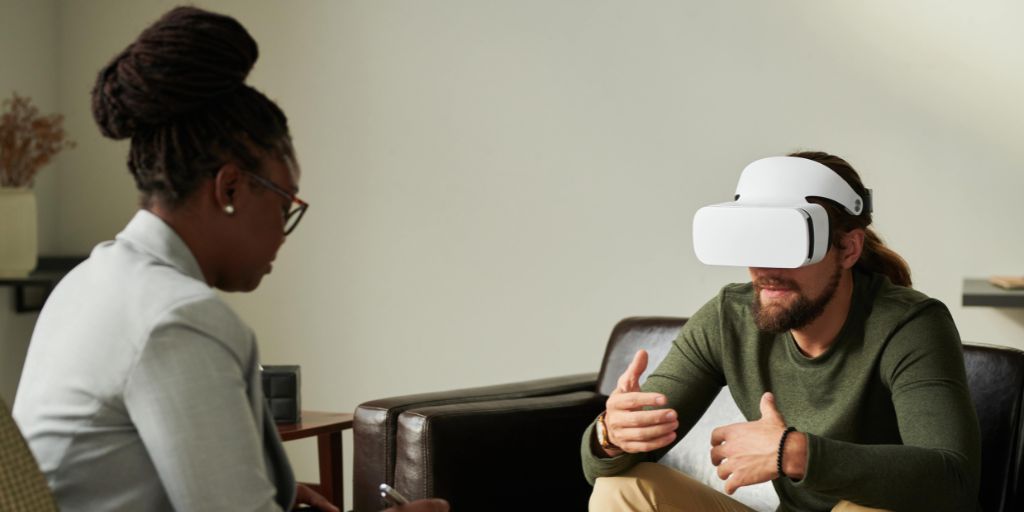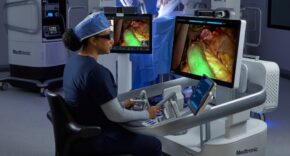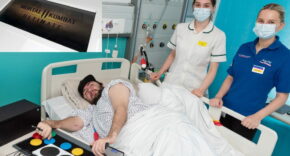
Tees, Esk and Wear Valleys NHS Foundation Trust (TEWV) and Teesside University have co-developed a new Augmented Reality (AR) mental health crisis simulation training app.
It is the first of its kind in the country and is designed to teach student nurses what it is like to help someone who may be experiencing a mental health crisis.
The app is used alongside an AR headset to simulate a crisis assessment whereby ‘Paul’ has been referred to his local crisis team for his mental health needs and concerns.
Tucan Studio who are based at Teesside University developed the app with TEWV staff bringing their knowledge of mental health and assessment skills to create its content and script, which was voiced by a Teesside actor.
Jools Smithies, senior nurse practice placement facilitator at TEWV, said: “In the scenario, students visit Paul’s home and must make decisions when interacting with him through pre-populated questions that result in different answers and support Paul whilst he is distressed.
“The AR pauses at various points within the simulation to allow the students to discuss their thoughts with a supervisor and to motivate them to consider other things such as safeguarding, if they haven’t already.
“This new innovative training will build student nurses’ confidence as well as communication, signposting and decision-making skills in crisis assessment that will be transferable in the real world.
“The results from our initial pilot showed a 51% increase in knowledge and 63% increase in confidence from our student nurses.”
Jack Fahey, senior creative producer at Teesside University, added: “We have built a whole 360 degree set of Paul’s living room where you can explore his environment.
“The Augmented Reality (AR) headset displays a virtual world in front of you whilst mixing in with real life. This is a great benefit for students because whilst taking in Paul’s environment they can also see their colleagues and supervisors who are helping to guide them through the process.”
Funded by the Enabling Effective Learning Environment (EELE) team in the NHS North East and North Cumbria (NENC) Integrated Care System (ICS), it has been piloted within TEWV’s nursing education team with hopes of it being rolled out across the country.
Kia Dow, a previous student nurse who trialled the headset and is now a crisis clinician in TEWV, said: “It’s quite surreal to use the headset, to ask questions and listen to various responses, to pause and then seek supervision on what you may or may not say, or why a response has been said.
“No classroom can give you real life crisis assessment experience. Student nurses often don’t get the opportunity to go out on crisis assessments, so you don’t get that face-to-face experience, but this gives you that. It also gives you the space to make an error and to learn from it, and it gives you the environment where you can ask questions and build your knowledge and confidence before you are put in that situation in real time.”
The new AR app is a part of the NHS-led Placement, Expansion, Technology, augmented, Reality (PETaR) project which aims to use Augmented/assisted Reality (AR/aR) headsets in a variety of settings including medical, surgical and community in different NHS trusts across the North East.
Emma Clayton, clinical lead at NENC Integrated Care Board (ICB), said: “Moving forward, we plan to use the AR app and headset within Trusts as part of the two-week induction training for students and new clinical staff to give them the skills and understanding they need to be able to support patients in crisis.”
Abigail Green, associate professor in clinical simulation at Teesside University, said: “From the perspective of sending our students to a simulated placement it gives them an opportunity to practice and rehearse scenarios that they wouldn’t necessarily be allowed to do independently without supervision. It gives them the opportunity to experience that before they’re expected to be qualified and go out and do it themselves.
“Speaking with some of our students about their experience using the AR headset, they have also been able to see things from a patient’s perspective. This is something you wouldn’t be able to see unless you do something like using the mental health AR app where you are put in the shoes of the patient.”











